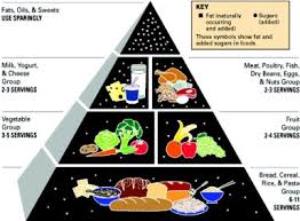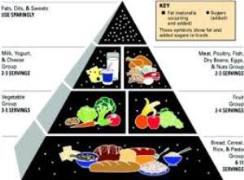 Do you remember the original food pyramid? The bottom of the pyramid reflected what we should eat the most and the top was what we should eat sparingly. Do you remember the specific instructions that if we just cut the fats in our diet, we will cure cardiovascular disease?
Do you remember the original food pyramid? The bottom of the pyramid reflected what we should eat the most and the top was what we should eat sparingly. Do you remember the specific instructions that if we just cut the fats in our diet, we will cure cardiovascular disease?
Well, it’s time for some deprogramming.
In 1992 the United States Department of Agriculture told us to eat between 6 and 11 portions of grains, pastas and cereal per day. They didn’t differentiate at all between refined (bad) carbs and unrefined (good) carbs. Nor did they explain that some people need more portions and others less.
They understated vegetables in terms of amount to eat and made no differentiation between proteins that were better to eat and those that should be consumed less often. There was no instruction about activity and exercise. They began to tell us that all fat was bad and that saturated fats caused heart disease.
What that really did was make everybody sick. The obesity epidemic and diabetes epidemic began then. If the no-fat–low-fat thing was correct, why have people only gotten fatter and fatter since then? The entire American population is 25-30 pounds heavier today than it was 35 years ago—and that’s scary!
What went wrong, and what do we know today that we didn’t know then? There was a premise created that heart disease is caused mostly by too much fat in our diet, specifically saturated fat. We now know that was not correct!
We got terrible advice to start eating margarine which was a trans fat because saturated fats were the bad guys. We all know that it was the trans fats that were causing our arteries to clog up and cause heart attacks. Once the public became more aware and many food manufacturers reduced or eliminated trans fats from their products, the rate of fatalities from heart disease began to fall.
Trans fats are one of the things we should not consume! They are commonly found in margarines and can be in any baked goods you buy so carefully read the ingredients. If it says hydrogenated or partially hydrogenated oil—that means trans fats. Do not consume!
We all know that processed sugar is high in calories and is empty calories—that is, it doesn’t supply any needed nutrition. But even within the “sugars” in your foods, there are some that do lot more damage than others.
First, let’s identify what in the ingredients is a sugar—so here’s your list: sucrose, maltose, dextrose, fructose, glucose, galactose, lactose, high fructose corn syrup, glucose solids, cane juice, dehydrated cane juice, cane juice solids, cane juice crystals, dextrin, maltodextrin, dextran, barley malt, beet sugar, corn syrup, corn syrup solids, caramel, buttered syrup, carob syrup, brown sugar, date sugar, malt syrup, diatase, diatastic malt, fruit juice, fruit juice concentrate, dehydrated fruit juice, fruit juice crystals, golden syrup, turbinado, sorghum syrup, refiner’s syrup, ethyl maltol, maple syrup, yellow sugar.
These are all different forms of sugars.
But there are two in particular that we should start paying attention to. If you see the word fructose or sucrose either by themselves or as part of another ingredient, stay away—far away!
What we are finding out that these forms of sugars metabolize differently than glucose and not in a way that is good for us. It actually converts to fat and not a good kind of fat. Besides that, we now see that overconsumption of sucrose and fructose (high fructose corn syrup) caused an increase in uric acid which leads to gout.
In addition, it seems likely that it is interfering with the hormone leptin. Leptin tells us when we are full we should stop eating. It seems that over the last 30 years or so, that our brain is not sending that signal when it should—it takes about 20 minutes after we are full until we receive that signal today. Therefore, we keep eating, and eating and eating and guess what? We over eat and get fat or obese!
These are ingredients that you will only find in the processed foods we commonly buy. Every baked good can have it, as well as prepared sauces like marinara sauce or pizza sauce. Many breakfast cereals have them also. You will find it in high amounts in juices and sodas and in a lot of fast food. You can even find it on the breads sold on the supermarket shelf.
Fructose occurs naturally in the fruits we eat. If we keep our consumption to that alone, and we have our three fruits a day (if you are a good exerciser you can get away with four), we are okay. The concentrations of fructose not occurring naturally in foods is very high—much higher that what we find in a piece of fruit.
As far as the white powdery stuff we put in our coffee and tea, it’s not as bad but it is still high in empty calories. So, use it sparingly when you really need to. I am by no means saying that one should avoid sugar completely and eliminating sugar is not a magic answer to weight loss. One of the secrets of successful weight loss is also not to feel deprived. So for most people, a little sugar is better. If you are truly addicted to this stuff, then of course, do without.
Artificial sweeteners have their own problems including causing the way your metabolism acts on sugars to go haywire. Most research today does not indicate that using artificial sweeteners helps you lose weight or avoid type 2 diabetes. It might even make you gain weight in the long-term.
I have always prided myself on basing both my advice to my clients as well as my methods used in my programs on scientific facts. But there is now very little question that the science that we have been using for the last 35 years was just plain wrong. It takes a lot for any of us to say that we were wrong—but in this case, the wrong has cost the public their health and wellbeing. Faulty research, a faulty premise and wrong results are to blame.
Here’s some advice—stick with whole foods, stay away from all processed food (not just because of the sugars and high fructose corn syrup), and remember that cooking in your own kitchen using ingredients that are as natural as possible is best. Stay away from take-out food and fast food. It might be easy and time efficient to pop something in the toaster oven or microwave, but it can cost you your health down the road, so keep it to a minimum.
Staying away from trans fats, sucrose and high fructose corn syrup will “add hours to your day, days to your year and years to your life.”
Alan Freishtat is an A.C.E. CERTIFIED PERSONAL TRAINER and a BEHAVIORAL CHANGE and WELLNESS COACH with over 19 years of professional experience. Alan is the creator and director of the “10 Weeks to Health” program for weight loss. He is available for private coaching sessions, consultations, assessments and personalized workout programs both in his office and by telephone and skype. Alan also lectures and gives seminars and workshops. He can be reached at 02-651-8502 or 050-555-7175, or by email at alan@alanfitness.com Check out the his web site –www.alanfitness.com US Line: 516-568-5027.
The words of this author reflect his/her own opinions and do not necessarily represent the official position of the Orthodox Union.

